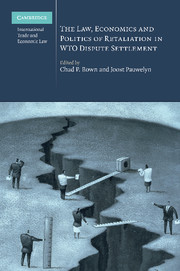Book contents
- Frontmatter
- Contents
- List of tables and figures
- Contributors
- Introduction: trade retaliation in WTO dispute settlement: a multi-disciplinary analysis
- PART I Background and goal(s) of WTO retaliation
- PART II A legal assessment after ten arbitration disputes
- PART III An economic assessment after ten arbitration disputes
- PART IV The domestic politics and procedures for implementing trade retaliation
- PART V Problems and options for reform
- PART VI New frontiers and lessons from other fields
- 21 Cross-retaliation and suspension under the GATS and TRIPS agreements
- 22 Cross-retaliation in TRIPS: issues of law and practice
- 23 Preliminary thoughts on WTO retaliation in the services sector
- 24 Compensation assessments: perspectives from investment arbitration
- 25 Reforming WTO retaliation: any lessons from competition law?
- Index
25 - Reforming WTO retaliation: any lessons from competition law?
Published online by Cambridge University Press: 26 February 2010
- Frontmatter
- Contents
- List of tables and figures
- Contributors
- Introduction: trade retaliation in WTO dispute settlement: a multi-disciplinary analysis
- PART I Background and goal(s) of WTO retaliation
- PART II A legal assessment after ten arbitration disputes
- PART III An economic assessment after ten arbitration disputes
- PART IV The domestic politics and procedures for implementing trade retaliation
- PART V Problems and options for reform
- PART VI New frontiers and lessons from other fields
- 21 Cross-retaliation and suspension under the GATS and TRIPS agreements
- 22 Cross-retaliation in TRIPS: issues of law and practice
- 23 Preliminary thoughts on WTO retaliation in the services sector
- 24 Compensation assessments: perspectives from investment arbitration
- 25 Reforming WTO retaliation: any lessons from competition law?
- Index
Summary
Introduction and preliminary observations
Perhaps it is because both competition law (or antitrust law as it is known in North America) and international trade law ultimately influence commercial outcomes that the question arises as to whether the regime of sanctions applied in one branch of law may have lessons for the other. The purpose of this brief chapter is to describe, where the author feels it is legitimate and appropriate, the possible implications of the sanctions regimes employed in competition law for the enforcement of international trade law and the WTO agreements in particular.
One challenge in drawing any implications for trade law is that, while competition laws have been on the statute books in some jurisdictions for over a hundred years, in fact, competition laws are for much of the world a relatively new phenomenon. Experience has revealed that the political machinations necessary to get many competition laws enacted in the first place often requires substantial compromise and, quite frankly, weakening of both the law's substantive provisions and sanctions regime.
Moreover, once a competition law regime is in place and the deficiencies associated with its initial implementation become well appreciated, then second generation reforms tend to be implemented. The latter typically involve the strengthening the sanctions regime of competition laws: that is, raising maximum fines, including the possibility of triple or multiple damages for injured parties, as well as including the possibility of incarcerating persons who have engaged in certain anticompetitive acts. In short, competition laws and their sanction regimes have been evolving over time and while this evolution may inform thinking about the preferred sanctions regime for the WTO, certain caveats necessarily arise as well.
- Type
- Chapter
- Information
- Publisher: Cambridge University PressPrint publication year: 2010
- 8
- Cited by



